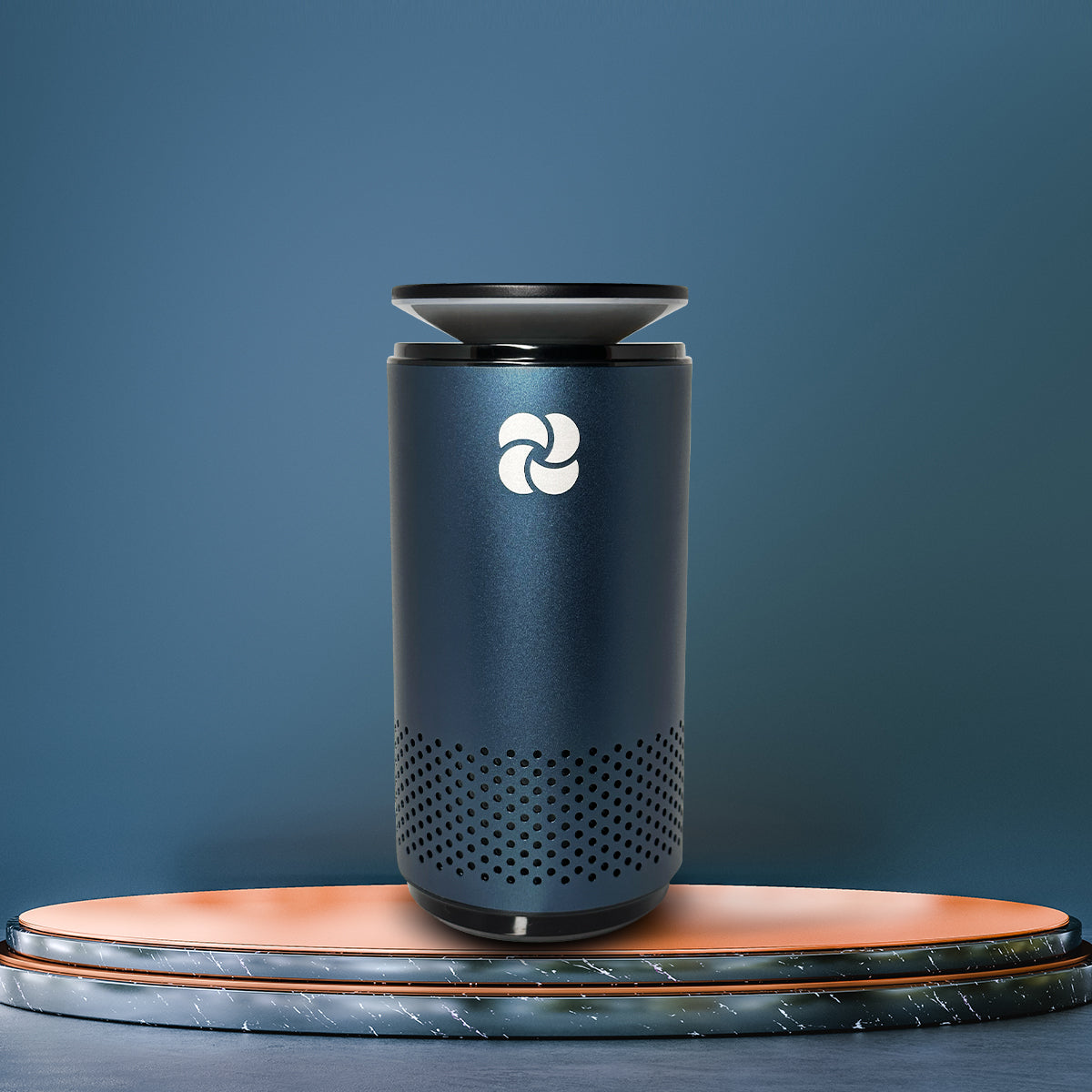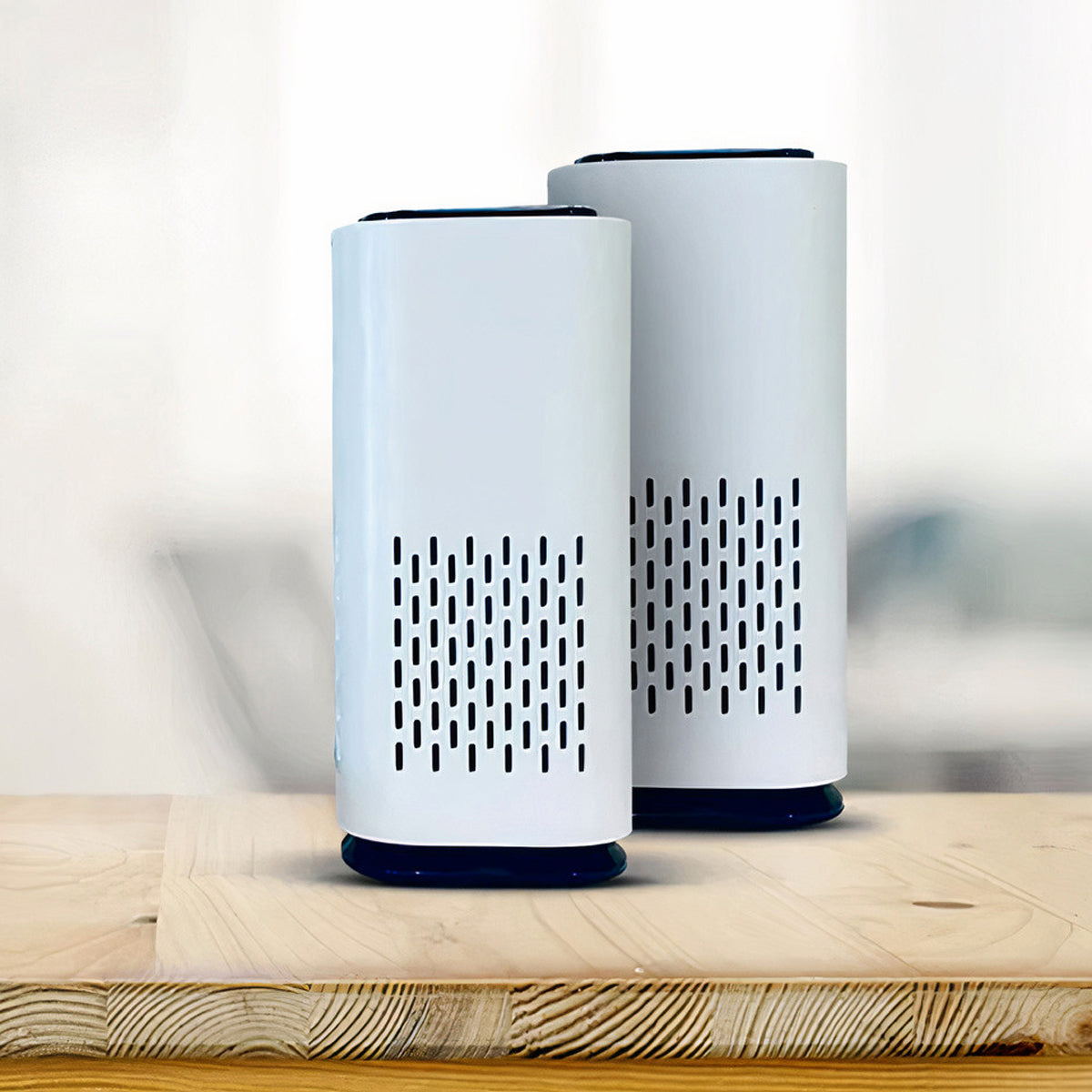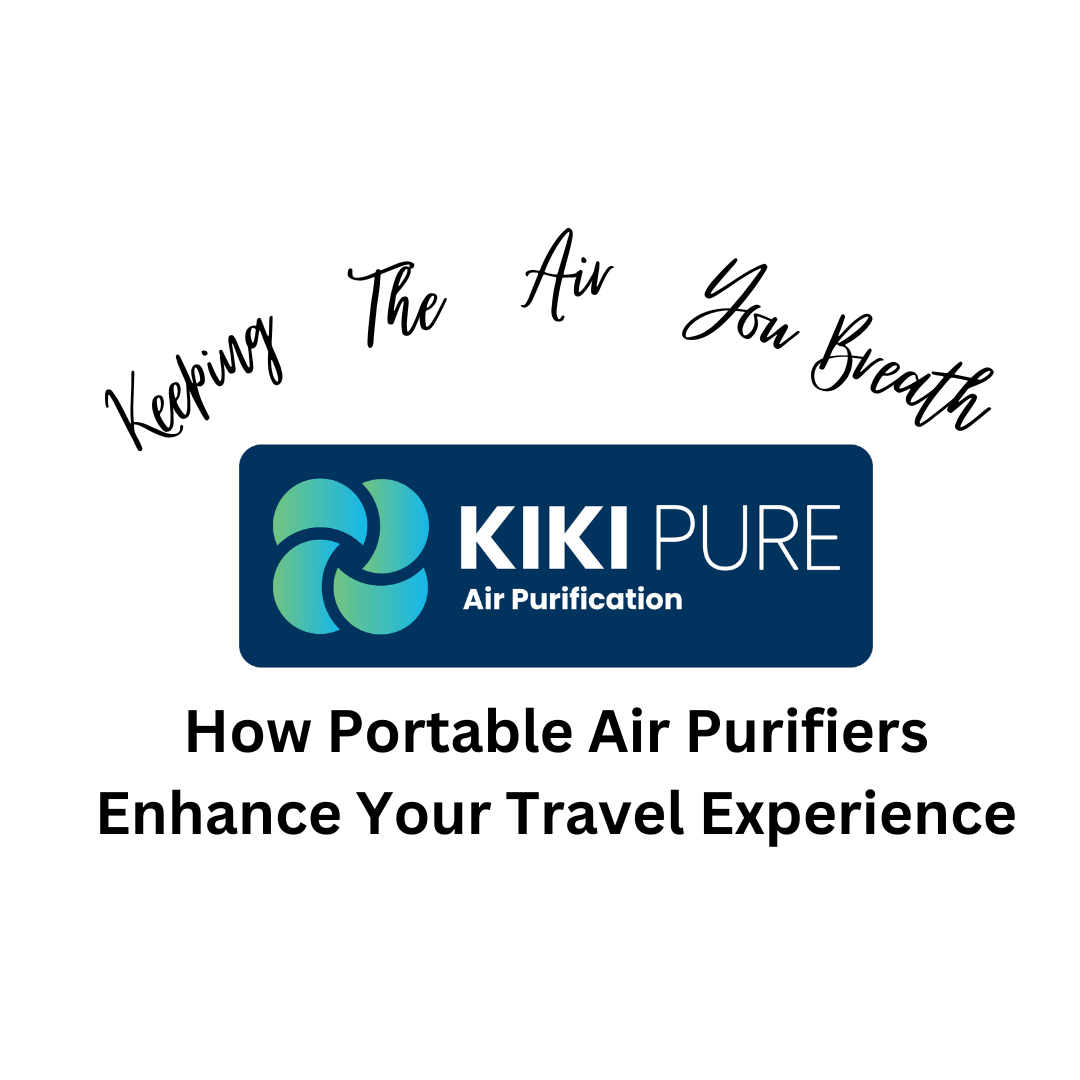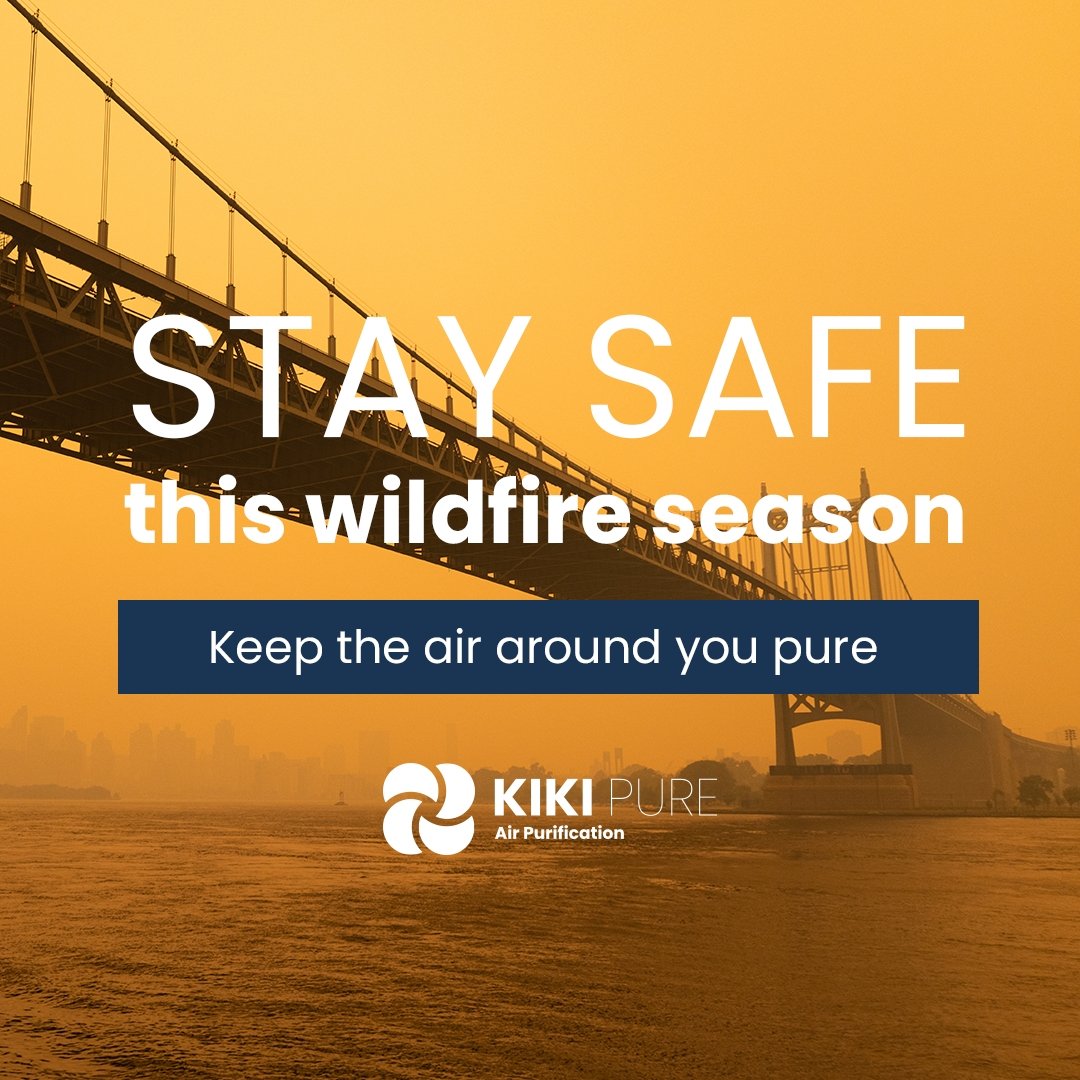Portable air purifiers are increasingly popular among travelers who seek better air quality in hotel rooms or temporary accommodations. The demand for these devices has risen due to COVID-19 and concerns about air quality during events like the Canadian Wildfires. People are concerned about their respiratory health and well-being while on the move, making portable air purifiers, such as the KIKI Pure line of high-quality air purification units, a valuable companion for travelers.
Introduction to portable air purifiers
Portable air purifiers are compact and lightweight devices designed to improve indoor air quality by removing pollutants, allergens, and other harmful particles from the air. They are typically small enough to be moved from one room to another or even taken on the go, making them ideal for use in various settings, including homes, offices, cars, and while traveling.
How effective are portable air purifiers?
Portable air purifiers are a valuable tool for improving air quality in small spaces and on the go. It’s important to find the right air purifier for your needs, and this can be done by taking proper room measurements and comparing them to the manufacturer's guidelines.
For instance, the KIKI Pure A2 UV & 3 Stage H13 Hepa air purifier covers up to 150 sq. ft. and is 99.96% effective at protecting against harmful allergens, bacteria, and viruses within the allotted space. Whereas the smaller unit, the KIKI Pure Mini A1 HEPA USB-C Powered air purifier, is perfect for filtering harmful allergens, pollen, and air pollutants in small rooms up to 100 sq. ft.
Considerations when choosing the right portable air purifier
When evaluating which air purifier is right for you, consider the following factors:
- Filter Type. Look for information on the types of filters used in the user guidelines, which can be found on the manufacturer's website. HEPA filters are highly effective at removing small particles, while activated carbon filters are excellent for eliminating odors and certain gasses.
- Room Size Coverage. Determine the recommended room size coverage of the air purifier. It should be appropriate for the area you intend to use it in.
- User Reviews. Read reviews and testimonials from individuals who have used the portable air purifier you are considering. Pay attention to their experiences, including any feedback on its effectiveness, noise level, ease of use, and durability.
- Battery life. Check to see how long the battery will last while out. Generally speaking, a portable air purifier with a battery life of around 10 – 12 hours is a great option.
- Simplicity. When using a product such as a portable air purifier, it’s important to confirm the simplicity of use. Be sure to check how to turn the unit on/off, and also be sure to test the fan speeds for ease of use.
- Certifications. Check if the product has been independently tested and certified for your region and is compliant with all Environmental Protection Agency and US regulations, notably the California Air Resource Board, or CARB which stipulates that these devices do not give off harmful Ozone emissions.
The importance of clean air
A statement from the White House noted the importance of air purification with regard to COVID-19 and the Canadian Wildfires, stating, “Improving indoor air has benefits beyond COVID-19: it will reduce the risk of getting the flu, a common cold, or other diseases spread by air, and lead to better overall health outcomes.”
A number of studies also note that the southern and eastern regions of the United States are experiencing significant pollution, characterized by elevated levels of O3 (ozone) and SO2 (sulfur dioxide). The cause of this pollution is largely attributed to wildfires that occurred in the Pacific Northwest. Wildfires have the capacity to affect air quality, even cities downwind from their source. In addition to CO (carbon monoxide), other hazardous compounds such as furan, benzene, and formaldehyde were found in the air during wildfires.
As a result of these wildfires, surface ozone, and fine particulate matter, which are known to have adverse effects on human health and well-being, were influenced by the seasonal changes induced by the wildfires. This indicates that air quality over North America's regions could be negatively impacted due to wildfires.
The potential consequences are troubling, as approximately 130 million people or more could be adversely affected by the pollution resulting from wildfires. This highlights the significance of understanding and addressing the impacts of wildfires on air quality to safeguard public health and the environment.
The benefits of using a portable air purifier
Using an air purifier can offer several benefits for your health and indoor environment. There are a number of advantages to air purification, either in your home or on the go.
- Elimination of Harmful Particles. Air purifiers can help eliminate harmful particles like bacteria, viruses, and certain airborne pathogens. This is especially valuable during flu seasons or when dealing with respiratory illnesses.
- Smoke and Pollution Control. Air purifiers can effectively capture smoke particles and pollutants, making them beneficial in areas prone to wildfires or regions with high outdoor air pollution levels.
- Allergy and Asthma Relief. An estimated 26 million people in the U.S. have asthma, which is equal to 1 in 13 people across the country. Air purifiers can be particularly beneficial for this population, as they can reduce allergens and irritants in the air. This can help eliminate allergy and asthma symptoms, such as sneezing, coughing, and wheezing.

Can air purification improve your health?
The Environmental Protection Agency (EPA) has conducted comprehensive research on air purifiers' effectiveness in improving a person’s overall health. In one review, the EPA reported “statistically significant enhancements in respiratory health and relief from allergy or asthma symptoms.” This finding underscores the benefit of air purifiers, especially those equipped with HEPA filters, to remove airborne particles and allergens, thus positively impacting individuals with respiratory conditions.
Another research review by the EPA evaluated the impact of air cleaners on cardiovascular health. Out of the 11 studies used, 10 demonstrated statistically significant improvements, indicating that air purifiers can also benefit cardiovascular well-being.
These studies provide a solid foundation that proves air purification can be beneficial in removing pollutants in the air that can cause lung and cardiovascular health concerns.
Where to buy a portable air purifier
Studies show that the air we breathe, including when there is wildfire smoke, can cause harmful effects on not only our lungs but our cardiovascular health as well. The importance of air purification has never been more important, and products such as the KIKI Pure A2 UV & 3 Stage H13 HEPA Air Purifier are an important companion while traveling. Portable devices like this can circulate the air in your vehicle, tent, or office space, reducing the risk of future health concerns for yourself or your family.
Enhancing your travel experience with the convenience of a portable air purifier can be a great way to be safe and breathe easy on the road.
To learn more or to purchase a KIKI Pure unit today, please visit their website at https://www.kikipure.com/
FAQ
Do air purifiers remove wildfire smoke?
Yes, air purifiers can help remove wildfire smoke particles from indoor air, mitigating its harmful effects. High-quality air purifiers equipped with HEPA filters can effectively filter fine particles, including smoke from wildfires.
Are air purifiers good for breathing?
Yes, air purifiers are good for breathing as they can improve indoor air quality by removing airborne pollutants, such as dust, allergens, smoke, and other harmful particles. High-quality air purifiers with HEPA filters can effectively capture these pollutants, providing cleaner air and promoting better respiratory health for individuals.
Can you take a portable air purifier on an airplane?
The Transportation Security Administration (TSA) and FAA allow the use of personal air purifiers on an airplane. However, it's essential to check with the specific airline's rules and regulations beforehand, as some airlines may restrict certain electronic device types. Ensure the purifier meets the airline's size and weight requirements and complies with any security guidelines for electronic devices during your flight.
About the Author
Amanda Jane is a freelance writer with a 15-year background as a nurse. Recognizing the importance of relaying complex medical information in an accessible manner, Amanda discovered her passion for writing as a means to bridge the gap between medical expertise and the public's understanding. Amanda strives to create impactful content that inspires, educates, and promotes well-being by combining her medical expertise and journalistic skills into everything she writes.
References
United States Environmental Protection Agency. Residential Air Cleaners: A Technical Summary. https://www.epa.gov/sites/default/files/2018-07/documents/residential_air_cleaners_-_a_technical_summary_3rd_edition.pdf
Journal of Geophysical Research. Intercontinental air pollution transport from North America to Europe: Experimental evidence from airborne measurements and surface observations https://agupubs.onlinelibrary.wiley.com/doi/full/10.1029/2004JD005045
United States Environmental Protection Agency. Which Populations Experience Greater Risks of Adverse Health Effects Resulting from Wildfire Smoke Exposure? https://www.epa.gov/wildfire-smoke-course/which-populations-experience-greater-risks-adverse-health-effects-resulting
Journal of Nature Communications. New seasonal pattern of pollution emerges from changing North American wildfires https://www.nature.com/articles/s41467-022-29623-8
Journal of Scientific Reports. Far-UVC (222 nm) efficiently inactivates an airborne pathogen in a room-sized chamber https://www.nature.com/articles/s41598-022-08462-z
The White House. Let’s Clear The Air On COVID https://www.whitehouse.gov/ostp/news-updates/2022/03/23/lets-clear-the-air-on-covid/
The White House. FACT SHEET: Biden Administration Launches Effort to Improve Ventilation and Reduce the Spread of COVID-19 in Buildings https://www.whitehouse.gov/briefing-room/statements-releases/2022/03/17/fact-sheet-biden-administration-launches-effort-to-improve-ventilation-and-reduce-the-spread-of-covid-19-in-buildings/
Asthma and Allergy Foundation of America. Asthma Facts and Figures. https://aafa.org/asthma/asthma-facts/#:~:text=How%20Common%20Is%20Asthma%3F,about%201%20in%2013%20people.&text=Nearly%2021%20million%20U.S.%20adults%20ages%2018%20and%20older%20have%20asthma.




